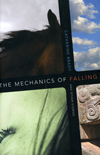The Mechanics of Falling
In the title story of Catherine Brady's new collection of short stories, the main character wakes up naked in a bathtub, hung over, and finds his guitar in the toilet. After he makes his way downstairs to ask his female roommate (their complicated relationship soon emerges) what happened, she says, "You got your hands on a bottle of tequila." After some teasing, their exchange continues:
In the title story of Catherine Brady's new collection of short stories, the main character wakes up naked in a bathtub, hung over, and finds his guitar in the toilet. After he makes his way downstairs to ask his female roommate (their complicated relationship soon emerges) what happened, she says, "You got your hands on a bottle of tequila." After some teasing, their exchange continues:
“I don't drink that much.”
She considers this. “No, you don't. Drinking's just your excuse. Why remember every stupid thing you did to end up like that when you can be amazed instead.”
This line is a perfect summation for most of Brady's stories in The Mechanics of Falling. These stories do not belabor small details or delve deeply into what happened in the past. The past exists on the periphery, influencing each narrator in its specific way, without becoming the main focus.
These San Francisco-based stories each inhabit a small world, constraining the movement of the characters. Consider “Seven Remedies,” an odd story about a house that never should have been bought: it fights each move Laurel and her family make to tame it. Laurel's sense of home is mercilessly stripped from her as the contractors tear the house apart, and only partially put it back together. The basement floor is rotting from water damage, the gas pipes are all leaking, the list is endless. The perimenopausal Laurel struggles to keep it together, but as the reader, I couldn't help but feel she only walked herself in increasingly small circles. She exhibits a supreme patience when visiting her ailing father, but loses it while trying to help her teenage son with his homework. She offers to pay for her housekeeper's doctor's visits, but can barely get her two children dressed for school.
Brady's prose is beautiful, if hard to keep up with. It twists and turns and explores more than it first seems to. It is the type of prose that begs for more than one reading. With it, she creates impregnable and flawed characters, bringing them to the edge of their comfort, as in “Those Who Walk During the Day,” where the narrator, a man who gave up his career and family to serve Jesus, is confronted with a junkie's suffocating love for his dying dog. It is an intriguing look at how people derive their own worth, how people heal and move on, and what comfort means.
This is Brady's third collection of stories, and her mastery of the craft shows. She is very good at revealing only the requisite amount of information, and fitting her characters into the worlds they have created for themselves. Her stories pull you in and allow for no distractions. She deftly explores relationships, delicately peeling back the layers to expose some truth, no matter how inconsequential. She is especially adept at the mother-daughter relationship, as she shows in "Slender Little Thing" and "Wicked Stepmother."
The Mechanics of Falling is a beautiful collection, populated with real people with unknown motives, people who have come to terms with their survival. These stories are filled with complex moments in complex lives, but one never feels rushed or deserted while reading them. The prose carries along, remarkably, just like Brady's characters.





